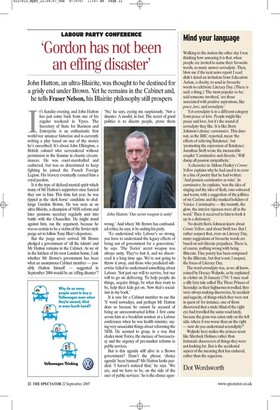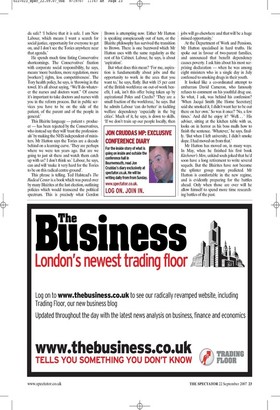'Gordon has not been an effing disaster'
John Hutton, an ultra-Blairite, was thought to be destined for a grisly end under Brown. Yet he remains in the Cabinet and, he tells Fraser Nelson, his Blairite philosophy still prospers 1 t's Sunday evening, and John Hutton has just come back from one of his regular weekend in Ypres. The Secretary of State for Business and Enterprise is an enthusiastic first world war amateur historian and is currently writing a play based on one of the stories he's unearthed. It's about John Elkington, a British colonel who surrendered without permission in the Somme in chaotic circumstances. He was court-marshalled and cashiered, but was so determined to keep fighting he joined the French Foreign Legion. His bravery eventually earned him a royal pardon.
It is the type of diehard martial spirit which many of Mr Hutton's supporters once fancied they saw in him. This time last year, he was tipped as the 'dark horse' candidate to challenge Gordon Brown. He was seen as an ultra-Blairite, a champion of NHS reform and later pensions secretary regularly sent into battle with the Chancellor. He might stand against him, ran the argument, because he was so certain to be a victim of the Soviet-style purge set to follow Tony Blair's departure.
But the purge never arrived. Mr Brown pledged a government of 'all the talents' and Mr Hutton remains in the Cabinet. As we sit in the kitchen of his west London home, I ask whether Mr Brown's government has been what an anonymous Cabinet member — possibly Hutton himself — suggested in September 2006 would be an `effing disaster'?
'No,' he says, eyeing me suspiciously. 'Not a disaster. A model, in fact. The secret of good politics is to disarm people, prove them wrong.' And where Mr Brown has confounded critics, he says, is by uniting his party.
'To understand why Labour's so strong, you have to understand the legacy effects of being out of government for a generation,' he says. 'The Tories' secret weapon was always unity. They've lost it, and we discovered it a long time ago. We're not going to throw it away, and those who predicted otherwise failed to understand something about Labour. Not just our will to survive, but our will to go on delivering. To help people do things, acquire things, be what they want to be, help their kids get on. Now that's socialism in my book.'
It is rare for a Cabinet member to use the `S' word nowadays, and perhaps Mr Hutton does so because he cannot be accused of being an unreconstructed leftist. I first came across him at a breakfast seminar at a Labour conference when he was health minister, saying very unsocialist things about reforming the NHS. He seemed to grasp, in a way that eludes most Tories, the menace of bureaucracy and the urgency of pro-market reforms in public services.
But is this agenda still alive in a Brown government? Hasn't the phrase 'choice agenda' been banned? Mr Hutton looks puzzled. 'I haven't noticed that,' he says. 'We are, and we have to be, on the side of the user of public services.' So is the choice agenda safe? 'I believe that it is safe. I am New Labour, which means I want a search for social justice, opportunity for everyone to get on, and I don't see the Tories anywhere near that agenda.'
He spends much time listing Conservative shortcomings. The Conservatives' fixation with corporate social responsibility, he says, means 'more burdens, more regulation, more [workers] rights, less competitiveness'. The Tory health policy, he says, is 'throwing in the towel. It's all about saying, "We'll do whatever the nurses and doctors want." Of course it's important to take doctors and nurses with you in the reform process. But in public services you have to be on the side of the patient, of the parent and of the people in general.'
This Blairite language — patient v. producer — has been rejected by the Conservatives, who instead say they will 'trust the professionals' by making the NHS independent of ministers. Mr Hutton says the Tories are a decade behind on a learning curve. 'They are perhaps where we were ten years ago. But are we going to just sit there and watch them catch up with us? I don't think so' Labour, he says, can and will 'make it very hard for the Tories to be on this radical centre-ground'.
This phrase is telling. Ted Halstead's The Radical Center is a book which was pored over by many Blairites at the last election, outlining policies which would transcend the political spectrum. This is precisely what Gordon Brown is attempting now. Either Mr Hutton is speaking conspicuously out of turn, or the Blairite philosophy has survived the transition to Brown. There is one buzzword which Mr Hutton uses with the same regularity as the rest of his Cabinet. Labour, he says, is about 'aspiration'.
But what does this mean? Tor me, aspiration is fundamentally about jobs and the opportunity to work in the area that you want to,' he says, flatly. But with 15 per cent of the British workforce on out-of-work benefit, I ask, isn't this offer being taken up by aspirational Poles and Czechs? 'They are a small fraction of the workforce,' he says. But he admits Labour 'can do better' in tackling welfare dependency 'especially in the big cities'. Much of it, he says, is down to skills. 'If we don't train up our people locally, then jobs will go elsewhere and that will be a huge missed opportunity.'
At the Department of Work and Pensions, Mr Hutton specialised in hard truths. He spoke out in favour of two-parent families, and announced that benefit dependency causes poverty. I ask him about his most surprising declaration — when he was among eight ministers who in a single day in July confessed to smoking drugs in their youth.
It looked like a co-ordinated attempt to embarrass David Cameron, who famously refuses to comment on his youthful drug use. So what, I ask, was behind his confession? 'When Jacqui Smith [the Home Secretary] said she smoked it, I didn't want her to be out there on her own.' So was it once? 'No, a few times.' And did he enjoy it? 'Well...' His adviser, sitting at the kitchen table with us, looks on in horror as his boss mulls how to finish the sentence. 'Whatever,' he says, finally. 'But when I left university, I didn't smoke dope. I had moved on from that.'
Mr Hutton has moved on, in many ways. In May, when he finished his first book Kitchener's Men, unkind souls joked that he'd soon have a long retirement to write several sequels. But the Blairites have not become the splinter group many predicted. Mr Hutton is comfortable in the new regime, and is evidently preparing for the battles ahead. Only when those are over will he allow himself to spend more time researching battles of the past.


































































 Previous page
Previous page